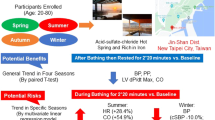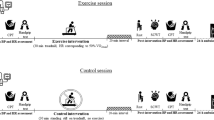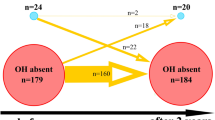Abstract
The Dead Sea (barometric pressure: 800 mm Hg) is an important balneotherapeutic centre for chronic dermatologic and arthritic diseases. In the past, hypertensive patients have complained sporadically of weakness and dizziness during a stay in the Dead Sea. It was therefore recommended that hypertensives do not stay at these health centres. The aim of our study was to investigate the changes in blood pressure (BP) parameters of 72 hypertensive and normotensive osteoarthritic and rheumatoid arthritic elderly patients during a 2-week stay in the Dead Sea, and to further evaluate the effect of different balneotherapeutic means on these BP changes. Following a primary BP assessment at the out-patient clinic (Beer Sheva barometric pressure: 745 mm Hg), the patients were divided into four groups: (1) thermomineral pool; (2) Dead Sea water baths; (3) combination of the aforementioned treatments; and (4) controls (no balneotherapy). We demonstrated that the systolic BP (SBP) of hypertensives and normotensives decreased by an average of 17 mm Hg and that diastolic BP (DBP) decreased by an average of 8 mm Hg from their basic clinic-measured values. These favourable results were sustained during the first 10 days duration, and by the end of their stay they had diminished slightly. Thermomineral water had an additional lowering effect on the BP of the normotensives, but the SBP of hypertensives increased. Immediately following Dead Sea bath immersion, we noted a temporary increase of SBP in normotensives only. No patient, hypertensive or normotensive, complained of dizziness, malaise, or any other complaint. In our experience, patients feel well at low altitudes, and there is no justification in upholding hypertension as a contraindication to balneotherapy in the Dead Sea.
This is a preview of subscription content, access via your institution
Access options
Subscribe to this journal
Receive 12 digital issues and online access to articles
$119.00 per year
only $9.92 per issue
Buy this article
- Purchase on Springer Link
- Instant access to full article PDF
Prices may be subject to local taxes which are calculated during checkout
Similar content being viewed by others
Author information
Authors and Affiliations
Rights and permissions
About this article
Cite this article
Paran, E., Neuman, L. & Sukenik, S. Blood pressure changes at the Dead Sea (a low altitude area). J Hum Hypertens 12, 551–555 (1998). https://doi.org/10.1038/sj.jhh.1000663
Received:
Revised:
Accepted:
Published:
Issue Date:
DOI: https://doi.org/10.1038/sj.jhh.1000663
Keywords
This article is cited by
-
Physicochemical fingerprinting of thermal waters of Beira Interior region of Portugal
Environmental Geochemistry and Health (2017)
-
Can balneotherapy improve the bowel motility in chronically constipated middle-aged and elderly patients?
International Journal of Biometeorology (2017)
-
Quality of life at the dead sea region: the lower the better? an observational study
Health and Quality of Life Outcomes (2011)
-
A proposal for a worldwide definition of health resort medicine, balneology, medical hydrology and climatology
International Journal of Biometeorology (2010)



